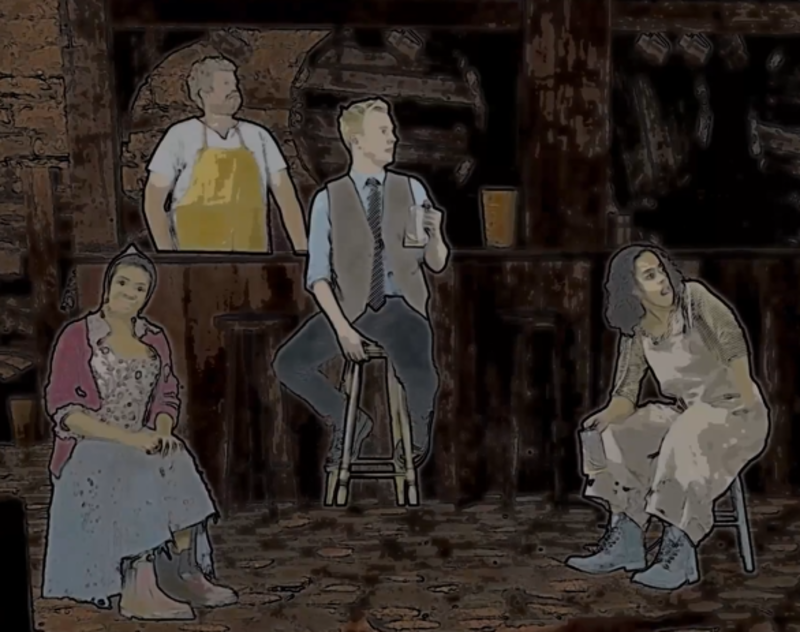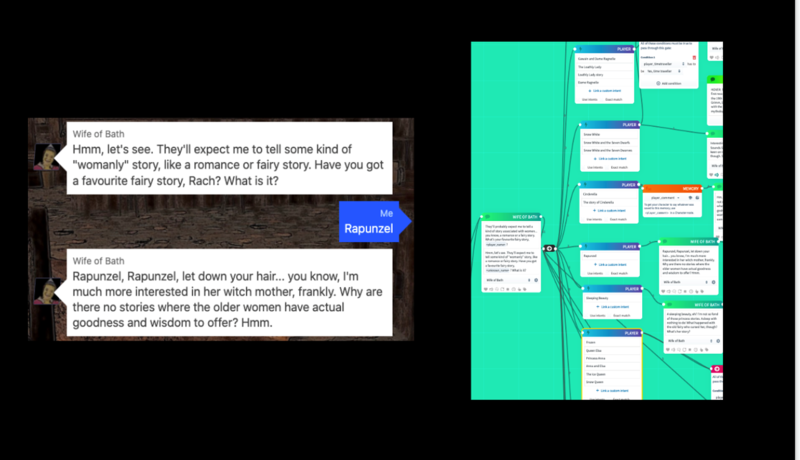Spotlight on Research: Virtual Chaucer

Virtual Chaucer is the result of a partnership between the English Faculty, a theatre company (Creation Theatre), and an AI-storytelling company (Charisma AI). It allows players to enter Chaucer’s Tabard Inn and interact with the pilgrims from the Canterbury Tales. At the beginning, you watch a filmed sequence of the pilgrims gathering and chatting in the inn. You then ‘talk’ to Harry Bailly, who is smart-programmed to respond to what you say, and who sets the player a task. The player chooses to speak to the Knight, the Miller, or the Wife of Bath, and is given questions to which they must find out the answers. They then see another filmed speech from their chosen character, before interacting with them through the AI-chat, in order to find out why the character is going on the pilgrimage, and what their story might be about. At the end of the experience – which takes about 10-15 minutes – the player feeds back to Harry Bailly, and wins rewards. If you have found out all the answers, you get to go on the pilgrimage.
A great deal of work went into trying to think of different things that players might say, and programming the characters to reply appropriately. For example, when the Wife of Bath asks the player for their favourite fairy story, the game is primed to respond to a whole range of possibilities. And there are generic ‘wild card’ responses for when something really surprising comes up. If players say certain rude words, they get routed to the Miller, who likes to swear…

Screenshot from the conversation with the Wife of Bath: on the left, you can see what the player sees; on the right, some of the programming behind it.
Part of my motivation for wanting to lead this kind of project is my commitment to getting young people in particular interested in reading a range of literature, and to help them to get beyond preconceptions that they might have. Many of us were keen readers of all kinds of material from a young age – but not everyone is. My hope is, of course, that some people will play this game and then go on to read the texts themselves. But I also know that for many people, this might be their only experience of Chaucer. I want those people to learn something, and to have their expectations challenged. So, for instance, if they speak to the Miller, they will learn about the Great Rising of 1381 and the social changes in English society after the plague.; the Knight will tell them about the dark side of medieval chivalry.
For many people, when they first read ‘classic’ or ‘canonical’ literature, it can seem deeply unfamiliar, and also untouchable. The experience of talking back to the characters is actually an experience with which many modern readers are familiar – teenagers often write ‘fan-fiction’ for instance, and have an understanding that texts have an afterlife beyond the page. But they may not be used to thinking of texts by Chaucer – or Austen, or Shakespeare, or Dickens – as being available to them in that way. In fact, medieval readers did interact with texts and characters in creative and active ways. Fifteenth-century scribes finished off tales that Chaucer had not completed (particularly the Cook’s), and included new tales by pilgrims such as the Plowman, to whom Chaucer had not given a tale. A century later, authors wrote new texts about Chaucer’s characters – most notably the popular ballad, The Wanton Wife of Bath (which was burned in the seventeenth century, and its printers put in prison). This kind of irreverent and creative response to texts is, for many readers, a crucial part of the reading experience.
Of course, playing this kind of experience in no way replicates the experience of reading the text! Although we have included little snippets of Middle English, and jokes that those familiar with Chaucer will appreciate, Virtual Chaucer does not aim to help students to understand the poetic brilliance and complexity of what Chaucer was doing. It is focused on stimulating interest and enthusiasm, and doing something a bit different with this extraordinary poem.
At the moment, Virtual Chaucer is a pilot – a short experience, that we know can be much improved. But it is infinitely scale-able. With major funding, we would like to make a Canterbury Tales experience that includes several tales, so that you go on to choose a tale to enter. We would also like to expand to other texts, so that a player might start in a kind of House of Fame, or fantasy library space, where you can choose from a range of books, and then enter a world of your choice. The screens aren’t going away, and we need to be able to harness them for literature and the humanities in ways that emphasise the fun and endless adaptability of narrative texts.
You can try it out at: https://www.virtual-chaucer.com/ (on a computer, not a phone, and with the volume up).
― Professor Marion Turner



